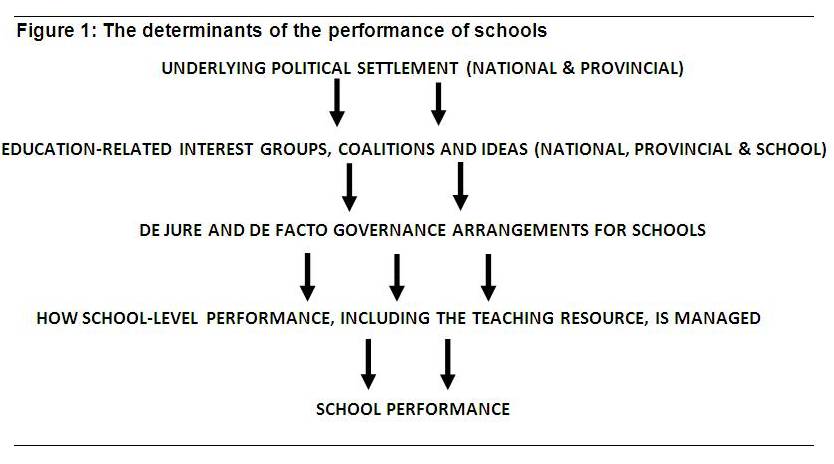Researching the politics of development
Projects

The provision of basic education in South Africa: Institutional and political challenges
Objectives
- Describe the de facto patterns of the governance of the teaching resource (with specific attention to their differences from the de jure formal rules);
- Explain why these de facto patterns take the form they do (with a focus on the interactions between institutions and politics); and
- Suggest ways of improving the governance of the teaching human resources which are compatible with South Africa’s institutional and political realities.
Cases
Basic education in South Africa has two distinctive features which make it an appropriate target for this project. First, a study of South Africa’s basic education system offers an ideal opportunity for multi-level research at national, provincial, district and school levels. The second distinctive analytical feature is the contested character of the country’s political settlement, which is likely to be particularly evident in the provincial and district level studies.
Main research question
How does the mixed reality of South Africa’s political settlement – part dominant party, part competitive, part developmental, part patronage – influence basic education policy-making and implementation at the national, provincial (including district) and school levels?
Figure 1 illustrates ESID’s framework for analysing the links between a country’s political settlement and the quality of public service provision.
Methods and research design
Methodologically, the study adopts three complementary approaches:
- Micro school-level studies, building on a stratified sampling and in-depth field interview platform;
- Use of stakeholder maps; and
- Process tracing to uncover the relative strength of ‘trumping’ influence networks committed to results-oriented governance of the human resource, and of ‘predatory’ influence networks seeking to capture control of human resources for patronage or more narrowly personal purposes.
The studies are grouped into four categories:
- National level
- School, provincial and district-level – Western Cape
- School, provincial and district level – Eastern Cape
- Overall synthesis
Policy implications
A key analytic distinction in the study is between ‘long route’ accountability and multi-stakeholder governance. It may be necessary to accept constraints on ‘long route’ functioning as exogenous ‘givens’. Multi-stakeholder engagement could thus emerge as an alternative, potentially more productive, entry point for improving the governance of the teacher and principal human resource.
How does this fit within ESID’s research agenda?
Consistent with ESID’s objective of understanding how the characteristics of different types of country-level political settlements influence the operation and performance of public service provision in programme 3, this research explores how a political and institutional perspective can identify new options for enhancing the performance of key sectors.
Researchers:
| Role | Name | Location |
|---|---|---|
| Lead Researcher | Brian Levy | University of Cape Town, South Africa and Johns Hopkins University |
| Researcher | Rob Cameron | University of Cape Town, South Africa |
| Researcher | Matt Chennells | University of Cape Town, South Africa |
| Researcher | Ursula Hoadley | University of Cape Town, South Africa |
| Researcher | Vinothan Naidoo | University of Cape Town, South Africa |
| Researcher | Mare Sarr | University of Cape Town, South Africa |
| Researcher | Lawule Shumane | University of Cape Town, South Africa |
Publications
Book
Levy, B., Cameron, R., Hoadley, U. and Naidoo, V. (eds.), (2018). The Politics and Governance of Basic Education: A Tale of Two South African Provinces (Oxford University Press).
ESID working papers
Levy, B. and Shumane, L. (2017). ‘School governance in a fragmented political and bureacratic environment: Case studies from South Africa’s Eastern Cape province‘. ESID Working Paper 84.
Kota, Z., Hendricks, M., Matambo, E. and Naidoo, V. (2017). ‘The governance of basic education in the Eastern Cape‘. ESID Working Paper 83.
Levy, B., Cameron, R., Hoadley, H. and Naidoo, V. (2016). ‘The politics and governance of basic education: A tale of two South African provinces‘. ESID Working Paper 67.
Cameron, R. and Levy, B. (2016). ‘The potential and limits of performance management: Improving basic education in the Western Cape‘. ESID Working Paper 62.
Hoadley, H., Levy, B., Shumane, S. and Wilburn, S. (2016). ‘Leadership, stakeholders and learner performance in four Western Cape schools‘. ESID Working Paper 61.
Cameron, R. and Naidoo, V. (2016). ‘When a “ruling alliance” and public sector governance meet: Managing for performance in South African basic education‘. ESID Working Paper 60.
